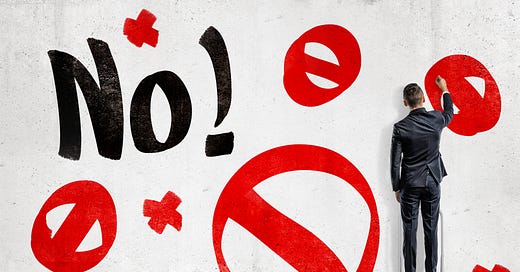No Bets For You!
SAFE Bet Act inspires state lawmakers in New York, Illinois, and Massachusetts to tighten sports betting rules around deposit/wager limits, ad restrictions, and more.
The Bulletin Board
THE LEDE: [Jerry Seinfeld voice] What’s the deal with restrictive sports betting bills?
BEYOND the HEADLINE: Are there really fewer sports betting ads.
ROUNDUP: Alberta iGaming update; PA skill-based slot bill; SC sports betting hearing; CO bill taxes promotional credits.
NEWS: A look at gambling tax increase proposals throught the country.
AROUND the (KALSHI) WATERCOOLER: The latest on the Kalshi front.
STRAY THOUGHTS: What does the future have in store for us?
SPONSOR’S MESSAGE: GeoComply's international solutions are unlocking compliance and security for the global market, so players everywhere can enjoy seamless, worry-free gaming experiences.
GeoComply’s Brazilian solution is designed specifically for the local market, offering seamless geolocation compliance (without requiring a companion app), robust anti-fraud measures, and streamlined licensing support—all while minimizing customer friction.
Learn how our advanced geolocation, identity, and fraud solutions safeguard your platform from account takeovers, fraudulent chargebacks, promotion abuse, and more!
The Lede: The Genesis of Restrictive Sports Betting Bills
Straight to the Point has been very outspoken in my belief that the restrictions proposed in the federal SAFE Bet Act will trickle down into state law.
Among the SAFE Bet Act policies are the following:
Restricts advertising between 8:00 AM and 10:00 PM, as well as during live sporting events.
Prohibits college player prop bets.
Bans credit cards.
Limits the use of AI to target bettors.
Creates a national self-exclusion database.
Limits bettors to five deposits in a 24-hour period.
Requires affordability checks on deposits of $1,000 or more in a 24-hour period or $10,000 or more over 30 days.
Prohibits reload bonuses.
Restricts VIP and tiered reward programs.
Mandates the disclosure of true odds for parlay wagers.
Calls for a crackdown on offshore sportsbooks.
Legislation in Illinois and Massachusetts uses SAFE Bet Act policies, and now New York is following suit.
New York Assemblymember Robert Carroll filed A 7962, which would institute the following restrictions on New York’s existing sports betting operators:
A $5,000 deposit limit over a 24-hour period.
Caps deposits at no more than five in a 24-hour period.
Caps wagering at $5,000 over a 24-hour period.
Prohibits the use of “odds boosts or similar offers, including advertising that contains the phrases "bonus", "no sweat", "bonus bet", or any other similar term,” in advertising.
Prohibits advertisements between 8:00 AM and 10:00 PM, as well as during live sporting events.
Advertisements cannot include “information on how to place a sports wager or how sports wagers work.”
Eliminates credit cards as an authorized deposit and withdrawal option.
Compare that to SD 1657, introduced by State Sen. John Keenan, which would:
Increase the current tax rate from 20% to 51%.
Prohibit in-play and prop bets.
Sets wagering limits to $1,000/day, $10,000/month without an affordability check.
Creates affordability checks and limits wagers to 15% of a patron’s bank account.
Prohibits ads during televised sports events.
Eliminates compensation based on a patron's wagering.
Adds bonuses, SGPs, and more to unfair and deceptive practices.
Or, to SB 2399, filed by Illinois State Rep. Bill Cunningham, that limits bettors to five deposits in a 24-hour period, prohibits credit cards, and requires affordability checks on anyone depositing $1,000 during a 24-hour period or $10,000 during a 30-day period. Cunningham also filed a bill, SB 2398, that would “prohibit a sports wagering licensee from using artificial intelligence to: (1) track the sports wagers of an individual; (2) create an offer or promotion targeting a specific individual; or (3) create a gambling product.”
Do you see the trend?
Beyond the Headline: Fewer Sports Betting Ads?
Sportsbooks are coming under increasing scrutiny for what many believe are excessive advertisements.
The SAFE Bet Act, as well as the state-level bills mentioned above (and others here), seek to rein in sports betting ads. That said, the number of sports betting ads, at least on television, has declined significantly in recent years.
In the article, Purdum notes, “Sportsbooks accounted for 0.8% of the total national spend on television commercials in 2024, while advertising for alcohol represented 1.4%. Gambling and alcohol combined for less than 5% of the total advertising during sports content.”
I want to add a couple of caveats to these numbers, though.
First, sports betting isn’t legal everywhere, so don’t expect too many targeted ad buys in California or Texas. Florida is also a monopoly market, which will reduce ad spending.
And as Joe Brennan noted, it doesn’t seem to capture betting content woven into the programming itself.
The research does note that when you factor all forms of advertising and widen the scope to include fantasy sports, that 44% decrease in ads disappears:
“When including fantasy sports and other forms of gambling across all media channels (TV, print, digital, out-of-home and cinema), the study found that gambling advertising volume decreased by 1%, while spending increased by 15% to approximately $2 billion. Traditional sports betting accounted for 61% of the overall spend.”
Roundup: Alberta iGaming; PA Skill-Based Slot Bill; SC Sports Betting Hearing; CO Promotional Deductions
Alberta iGaming bill continues to make progress [Covers.com]: Alberta is inching closer to becoming the second Canadian province with competitive, regulated online gambling. Per Geoff Zochodne over at Covers.com, “Bill 48, the iGaming Alberta Act, passed its second reading on Wednesday in Edmonton. The bill was then referred to the legislature’s “Committee of the Whole,” where it will undergo a clause-by-clause review of its provisions and where amendments to the legislation can be proposed.”
Pennsylvania lawmaker reintroduces bill regulating “skill-based” slot machines [Play Pennsylvania]: Pennsylvania State Sen. Gene Yaw reintroduced legislation to regulate and tax skill games. As was the case with his failed effort last session, SB 626 would tax the machines at just 16%, significantly lower than the 52% tax rate on slot machines at the state’s licensed casinos. The tax rate has been a major sticking point in regulating the machines, which remain in widespread use across the state.
South Carolina hearing on sports betting: The Revenue Policy Legislative Subcommittee of the House Ways and Means Committee is scheduled to discuss multiple gambling topics today, including a proposed casino H 4176 (previous STTP coverage), exempting skill-based competitions from gambling laws H 4129, and sports betting H 3625. A link to the stream can be found here.
Colorado bill would tax free bets from sportsbooks [Colorado Sun]: Colorado sports betting operators are currently able to deduct some of the promotional credits they give away, but new legislation, HB 1311, would put an end to that. Per the Colorado Sun, the bill, if passed, “would generate nearly $12 million in cash next year for water planning, conservation efforts and such things as irrigation system repair and the purchase of water rights.”
SPONSOR’S MESSAGE: Nominations are now open for the 2025 Vixio Global Regulatory Awards!
Celebrate the unsung heroes of compliance and responsible gambling by submitting your nominations.
Submitting is quick, free, and simple, and you can submit for multiple categories.
🗓️ Deadline: May 19th
🔎 Learn More & Submit: https://gamblingcomplianceawards.com/2025-awards-categories
News: Checking In On Tax Increase Proposals
While betting options outside the regulatory framework (sweepstakes and prediction markets) are proliferating across the country, states are, for some unknown reason, determined to make it even more difficult for regulated operators.
New Jersey
New Jersey Gov. Phil Murphy delivered one of several keynote addresses at the recently concluded East Coast Gaming Congress. Murphy’s address made headlines for what he didn’t say, as Murphy didn’t mention the online gambling tax rate he put into his budget. More from STTP here.
President of the Casino Association of New Jersey and Resorts CEO Mark Giannantonio told Casino Reports, “He is confident, in spite of that issue not being addressed, that his industry will be able to persuade Murphy that such a tax hike would be unwise.”
And according to Eilers & Krejcik Gaming (a newsletter sponsor), “We are hearing that New Jersey OSB operators are making the case against Gov. Phil Murphy’s proposed sports betting tax increase by noting that event contract operators, a form of competition, pay zero in state taxes.”
Separately, New Jersey Rep. Rosy Bagolie filed A5349, which would push the online gambling tax rate to 30%. A companion bill has been introduced in the Senate, S 3064.
North Carolina
Meanwhile, an out-of-the-blue proposal that doubles the state’s sports betting tax rate from 18% to 36% in North Carolina is being fast-tracked through the legislature. The tax hike was included in the Senate budget proposal, which the chamber passed last week.
The House has yet to release its budget, and it remains unclear where lawmakers in the lower chamber stand on the issue. Also of note, Gov. Josh Stein’s budget didn’t include a sports betting tax increase.
Other Active Efforts
Massachusetts: SD 1657 would increase the sports betting tax rate to 51% and radically restrict the Massachusetts sports betting market. STTP does not expect Massachusetts to increase its tax burden on licensed sports betting operators.
Kansas: Last week’s news about Kansas isn’t a tax increase per se, but it serves as the impetus for the state to negotiate a better deal that generates more revenue. This effort is far more intriguing, as it serves as a harbinger of an increase next year.
Indiana: Indiana State Sen. Fady Qaddoura introduced a bill, SB 394, which would raise the tax on sports betting operators from 9.5% to 11%. The bill is still active, but hasn’t gained any traction.
Failed Efforts
Ohio: Ohio Gov. Mike DeWine has proposed doubling the sports betting tax rate on operators from 20% to 40% in his latest budget. DeWine doubled the rate from 10% to 20% in 2023. The legislature struck the tax increase from their budget, effectively ending its chances this year.
Indiana: Rep. Ethan Manning’s online casino bill was amended to include a tax increase on mobile sports betting operators from 9.5% to 20%. The bill has been pulled by Manning.
Maryland: Maryland Gov. Wes Moore’s budget proposal would increase the state’s sports betting tax rate from 15% to 30%. A yet-to-be-finalized budget agreement between the legislature and the governor included a more modest 5% increase.
Around the (Kalshi) Watercooler
Social media conversations, rumors, and gossip.
Another partnership for Kalshi:
More from Andrew Kim (I posted the first tweet in a 17-tweet thread):
Also, look for my podcast interview with Andrew later today.
In other Kalshi news, the company has filed its third lawsuit, adding Maryland to its existing litigation against Nevada and New Jersey.
Stray Thoughts
"The future is unknown, but it is the only place we are going." ~ Ilya Prigogine










